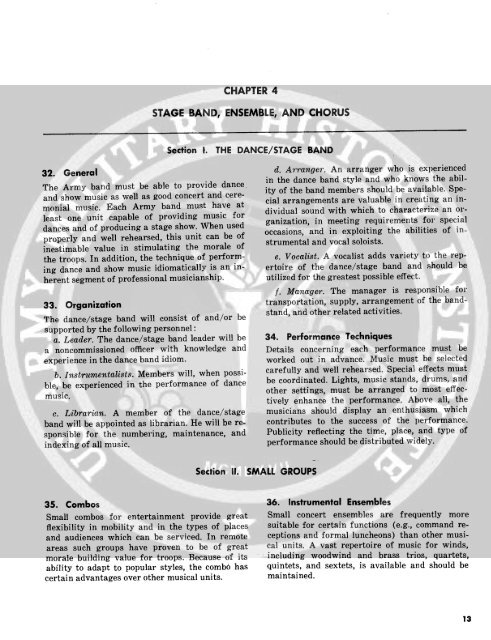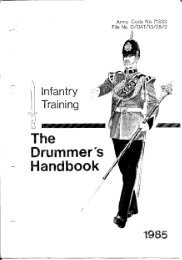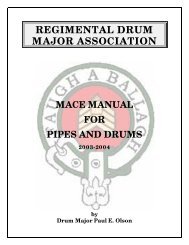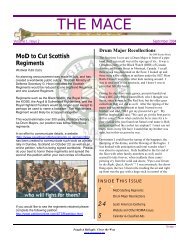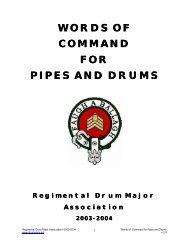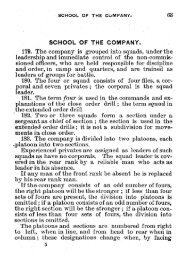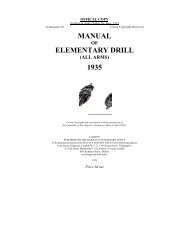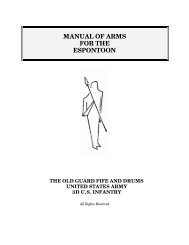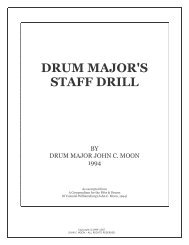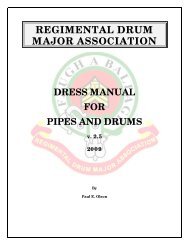The Military Band - Regimental Drum Major Association
The Military Band - Regimental Drum Major Association
The Military Band - Regimental Drum Major Association
Create successful ePaper yourself
Turn your PDF publications into a flip-book with our unique Google optimized e-Paper software.
CHAPTER 4<br />
STAGE BAND, ENSEMBLE, AND CHORUS<br />
Section i. THE DANCE/STAGE BAND<br />
32. General d. Arranger. An arranger who is experienced<br />
<strong>The</strong> Army band must be able to provide dance in the dance band style and who knows the abiland<br />
show music as well as good concert and cere- ity of the band members should be available. Spemonial<br />
music. Each Army band must have at cial arrangements are valuable in creating an inleast<br />
one unit capable of providing music for dividual sound with which to characterize an or-<br />
dances and of producing a stage show. When used<br />
properly and well rehearsed, this unit can be of<br />
inestimable value in stimulating the morale of<br />
the troops. In addition, the technique of performing<br />
dance and show music idiomatically is an inherent<br />
segment of professional musicianship.<br />
ganization, in meeting requirements for special<br />
occasions, and in exploiting the abilities of in-<br />
strumental and vocal soloists.<br />
e. Vocalist. A vocalist adds variety to the rep-<br />
ertoire of the dance/stage band and should be<br />
utilized for the greatest possible effect.<br />
f. Manager. <strong>The</strong> manager is responsible for<br />
33. Organization transportation, supply, arrangement of the band-<br />
<strong>The</strong> dance/stage band will consist of and/or be stand, and other related activities.<br />
supported by the following personnel:<br />
a. Leader. <strong>The</strong> dance/stage band leader will be<br />
a noncommissioned officer with knowledge and<br />
experience in the dance band idiom.<br />
34. Performance Techniques<br />
Details concerning each performance must be<br />
worked out in advance. Music must be selected<br />
b. Instrumentalists. Members will, when possible,<br />
be experienced in the performance of dance<br />
music.<br />
c. Librarian. A member of the dance/stage<br />
band will be appointed as librarian. He will be responsible<br />
for the numbering, maintenance, and<br />
indexing of all music.<br />
carefully and well rehearsed. Special effects must<br />
be coordinated. Lights, music stands, drums, and<br />
other settings, must be arranged to most effectively<br />
enhance the performance. Above all, the<br />
musicians should display an enthusiasm which<br />
contributes to the success of the performance.<br />
Publicity reflecting the time, place, and type of<br />
performance should be distributed widely.<br />
Section II. SMALL GROUPS<br />
35. Combos 36. Instrumental Ensembles<br />
Small combos for entertainment provide great Small concert ensembles are frequently more<br />
flexibility in mobility and in the types of places suitable for certain functions (e.g., command reand<br />
audiences which can be serviced. In remote ceptions and formal luncheons) than other musiareas<br />
such groups have proven to be of great cal units. A vast repertoire of music for winds,<br />
morale building value for troops. Because of its including woodwind and brass trios, quartets,<br />
ability to adapt to popular styles, the combo has quintets, and sextets, is available and should be<br />
certain advantages over other musical units. maintained.<br />
13


